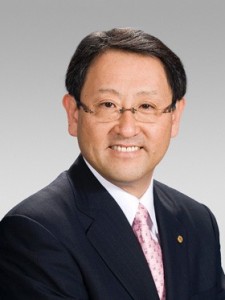
After being hammered in the press for his low visibility, Toyota CEO Akio Toyoda will make his third appearance in two weeks to address the company's safety problems.
After taking some hits for his relatively low profile as Toyota became mired in a series of safety scandals, the automaker’s CEO, Akio Toyoda, has scheduled his third meeting with the media in barely two weeks; but the grandson of the giant Japanese automaker has yet to confirm whether he will appear before a U.S. Congressional hearing looking into Toyota’s ongoing recall problems.
In a terse invitation, Toyota said the company’s president and CEO would address “its approach to quality,” as well as deliver an update on the embarrassing recall of its third-generation 2010 Prius hybrid, which it belatedly acknowledged suffers from braking issues. It is not known whether Toyoda will also address reports – which first appeared on TheDetroitBureau.com, earlier this month – that the second-generation Prius, sold from 2005 through 2009, may also have isues with its complex braking system.
In recent days, the automaker has stepped up a campaign aimed at calming worried owners and assuaging potential customers that quality and safety issues are being adequately addressed. In an interview with TheDetroitBureau.com, last week, Bob Carter, head of the Toyota division, asserted that the company has done everything short of hitting its vehicles “with lightning bolts” to validate its claims that faulty electronic controls are not responsible for claims of so-called “unintended acceleration.”
More than 8 million Toyota vehicles have been recalled worldwide, since last October, due to problems that can result in the vehicle surging out of control. The initial recall target floor mats that can entrap the accelerator pedal. A second action, announced in January, is aimed at fixing potentially sticky accelerator pedals.
Despite Toyota’s assurances that it has isolated the causes of unintended acceleration, Toyota attorney Theodore Hester sent a letter to the House Oversight and Government Reform Committee – which will hold a hearing on Toyota’s problems, on February 24 – pledging the automaker will be “re-examing these complaints” and will conduct “exhaustive and robust” testing.
Along with the unintended acceleration problems, Toyota recalled 440,000 Prius sedans, this month, acknowledging that “overly-aggressive ABS” systems can cause the 2010 model’s brakes to briefly and inadvertently release if a vehicle strikes a bump or icy patch during braking.
But in his interview, last week, Toyota Group Vice President Carter revealed that since news of the Prius problems began to surface, there has been a nearly five-fold increase in complaints alleging similar problems with hybrids built in prior years. Carter described that as a “head-scratcher,” adding that Toyota engineers have yet to identify a problem with the second-generation Prius.
As the halo car for Toyota, the Prius recall has been particularly embarrassing, despite the relatively small number of cars involved when compared to the unintended acceleration problem. But the situation is not yet under control.
On Friday, Toyota announced it would recall Tacoma pickups because of driveshaft issues. And, meanwhile, a federal investigation is now looking at reports that some Corolla models can inadvertently drift while on the highway. The Corolla and Matrix models are also under investigation because of claims some versions can unexpectedly stall out, sometimes at high speeds.
